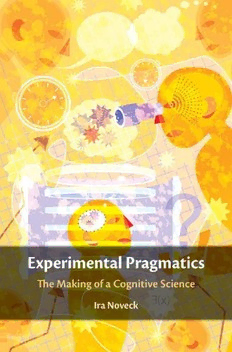
Experimental Pragmatics: The Making of a Cognitive Science PDF
Preview Experimental Pragmatics: The Making of a Cognitive Science
Experimental Pragmatics How does a listener understand a sarcastic “That was a wonderful speech” when the words point to a positive review? Why do students of introductory logic interpret “Some cabs are yellow” as “Not all cabs are yellow” when the meaning of “some” is compatible with “all”? Pragmatics aims to explain how listeners draw out a speaker’s meaning from utterances, an astonishing feat when one considers that the words in a sentence hardly suffice for fully comprehending what the speaker intended. Given the nature of pragmatics, it is going to take the interdisciplinary firepower of many cognitive sciences – including philosophy, experimental psychology, linguistics, and neuroscience – to fully appreciate this uniquely human ability. In this book, Ira Noveck, a leading pioneer in experimental pragmatics, engagingly walks the reader through the phenomena, the theoretical debates, the experiments, as well as the historical development of this growing academic discipline. Ira Noveck is a research director at the Centre National de la Recherche Scientifique in France. He is based at the Institut des Sciences Cognitives – Marc Jeannerod in Lyon, France. He is coeditor of the first volume on Experimental Pragmatics (2004), is responsible for creating a European research network of experimental pragmatists (called EURO-XPRAG), and consults with regional networks, such as xprag.de and xprag.it. Experimental Pragmatics The Making of a Cognitive Science Ira Noveck Institut des Sciences Cognitives – Marc Jeannerod University Printing House, Cambridge CB2 8BS, United Kingdom One Liberty Plaza, 20th Floor, New York, NY 10006, USA 477 Williamstown Road, Port Melbourne, VIC 3207, Australia 314–321, 3rd Floor, Plot 3, Splendor Forum, Jasola District Centre, New Delhi – 110025, India 79 Anson Road, #06-04/06, Singapore 079906 Cambridge University Press is part of the University of Cambridge. It furthers the University’s mission by disseminating knowledge in the pursuit of education, learning, and research at the highest international levels of excellence. www.cambridge.org Information on this title: www.cambridge.org/9781107084902 DOI: 10.1017/9781316027073 © Ira Noveck 2018 This publication is in copyright. Subject to statutory exception and to the provisions of relevant collective licensing agreements, no reproduction of any part may take place without the written permission of Cambridge University Press. First published 2018 Printed and bound in Great Britain by Clays Ltd, Elcograf S.p.A. A catalogue record for this publication is available from the British Library. ISBN 978-1-107-08490-2 Hardback Cambridge University Press has no responsibility for the persistence or accuracy of URLs for external or third-party internet websites referred to in this publication and does not guarantee that any content on such websites is, or will remain, accurate or appropriate. In memory of my father, Simon Noveck (1921–2011) Contents List of Figures page xi List of Tables xv Preface xvii Acknowledgments xxi List of Abbreviations xxvii 1 Defining Pragmatics: The What, the How, and Areas of Disagreement 1 Sources of Gappiness: A Nonexhaustive List 4 How to Conceive of Gaps and the Ways to Bridge Them 9 Where Do We Go from Here? 12 2 Grice’s Monumental Proposal and Reactions to It 14 Natural versus Nonnatural Meaning 16 What Is Said versus What Is Meant 19 Reactions 23 Where Do We Go from Here? 33 3 The Experimentalist’s Mindset 35 Experimental Psychology: A Very Condensed History 37 Cognitive Psychology Itself Investigates Intuitive Judgments 42 How Does One Test a Theory? 44 Relevant Positive Achievements from the Cognitive Sciences 45 Where Do We Go from Here? 49 4 A Consideration of Experimental Techniques 52 Developmental Data 52 Reactions at the Millisecond Level 53 Neuroscientific Methods 57 Crowdsourcing 60 Where Do We Go from Here? 61 5 Early Experimental Pragmatics 62 On the Positive Side: Grice Helps Explain Non-logical Responses 62 On the Negative Side: Extrapolations of Gricean Theory Lead to Disconfirmations 69 Taking Stock 75 vii viii Contents 6 How Logical Terms Can Be Enriched: Exposing Semantic-Pragmatic Divergences 78 Preliminaries 79 The Investigation of Scalar Implicatures: A Historical Account 80 Summing Up 99 7 Grammatical or Semantic Approaches to Scalar Implicatures 102 On Gricean Claims 103 Embedded Implicatures 103 Experiments with Embedded Scalar Terms 115 What Have the Experiments on Embedded Implicatures Accomplished? 119 8 Conditionals 121 Enrichments Linked to Conditionals Do Not Line Up with Those of Scalars 125 Doing Experimental Pragmatics on Conditionals 129 9 Referring 137 Developmental Studies 137 Referring Adults 149 When Context Is Viewed as a Constraint 154 Summing Up 157 10 Speaking Falsely and Getting Away with It: Post-Gricean Accounts of Metaphor and Other Lexical Adjustments 159 The Advent of Post-Gricean Accounts on Nonliteral Language 160 The Psycholinguistic Processing Question 160 Relevance Theory’s Account of Metaphor: Loose Use 163 Recent Experiments 169 Concluding Remarks about Metaphor 171 11 Irony: Shifting Attention and Reading Intentions 172 Grice’s Maxims and Attitude 173 Echoic Mention Theory 173 Is It Effortful or Not? 175 Doing Experimental Pragmatics on Irony 177 12 Pragmatic Abilities among Those with Autism 184 How Autism Became a Topic for Experimental Pragmatics 185 Alternative Accounts 191 Concluding Remarks 192 13 More Topics for Experimental Pragmatics: An All-You-Can-Eat Buffet 194 Logical Metonymy 194 Metonymy 195 Negation 197 Presupposition 201 Prosody 204 Concluding Remarks 208 Contents ix 14 Opinionated Conclusions and Considerations for the Future 210 Two Kinds of Pragmatic Inference? 211 Revisiting Scalar Inferences 217 The Wide-Excavation Approach: Current and Future Work 223 How Did We Get Here? Do We Conclude? 224 Bibliography 227 Index 249
